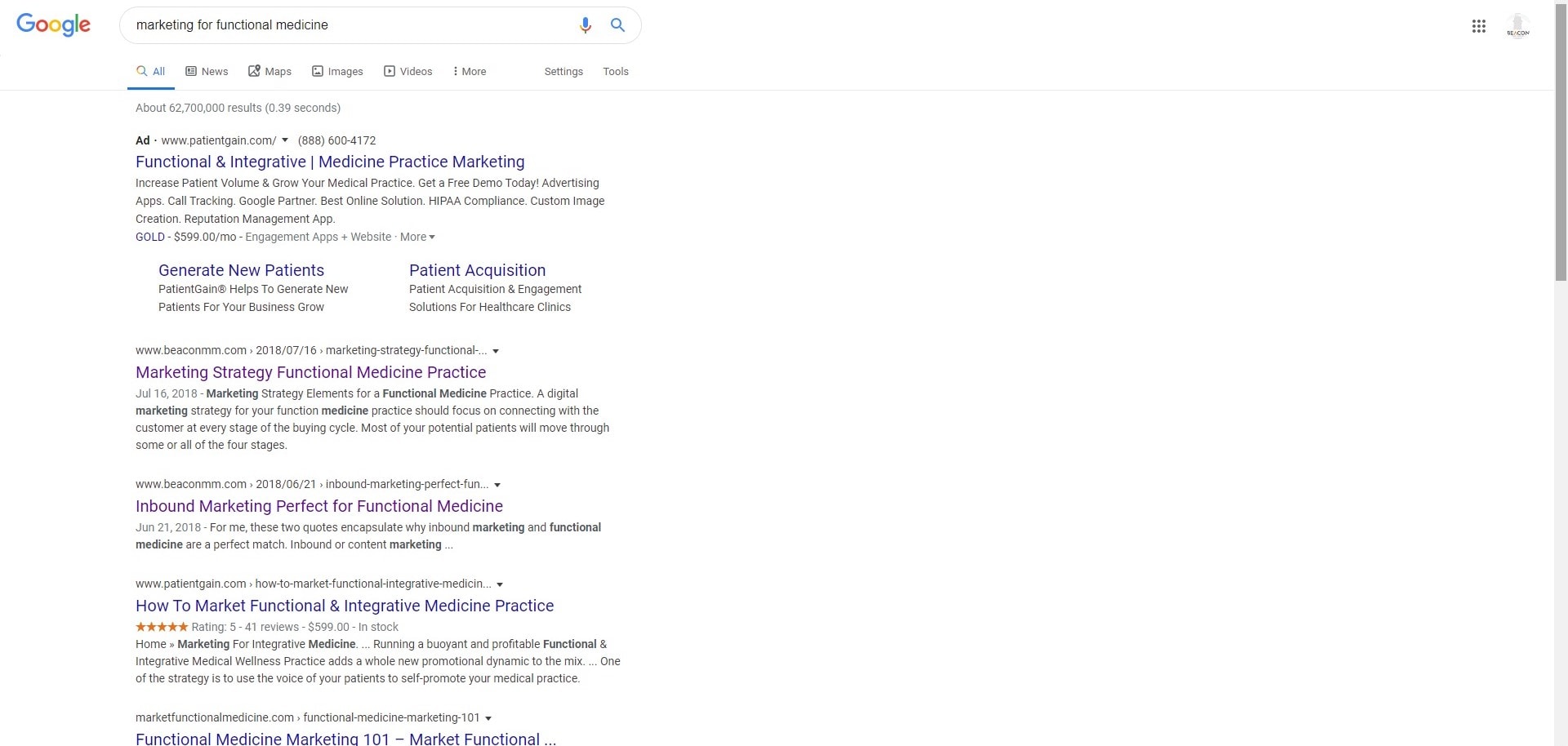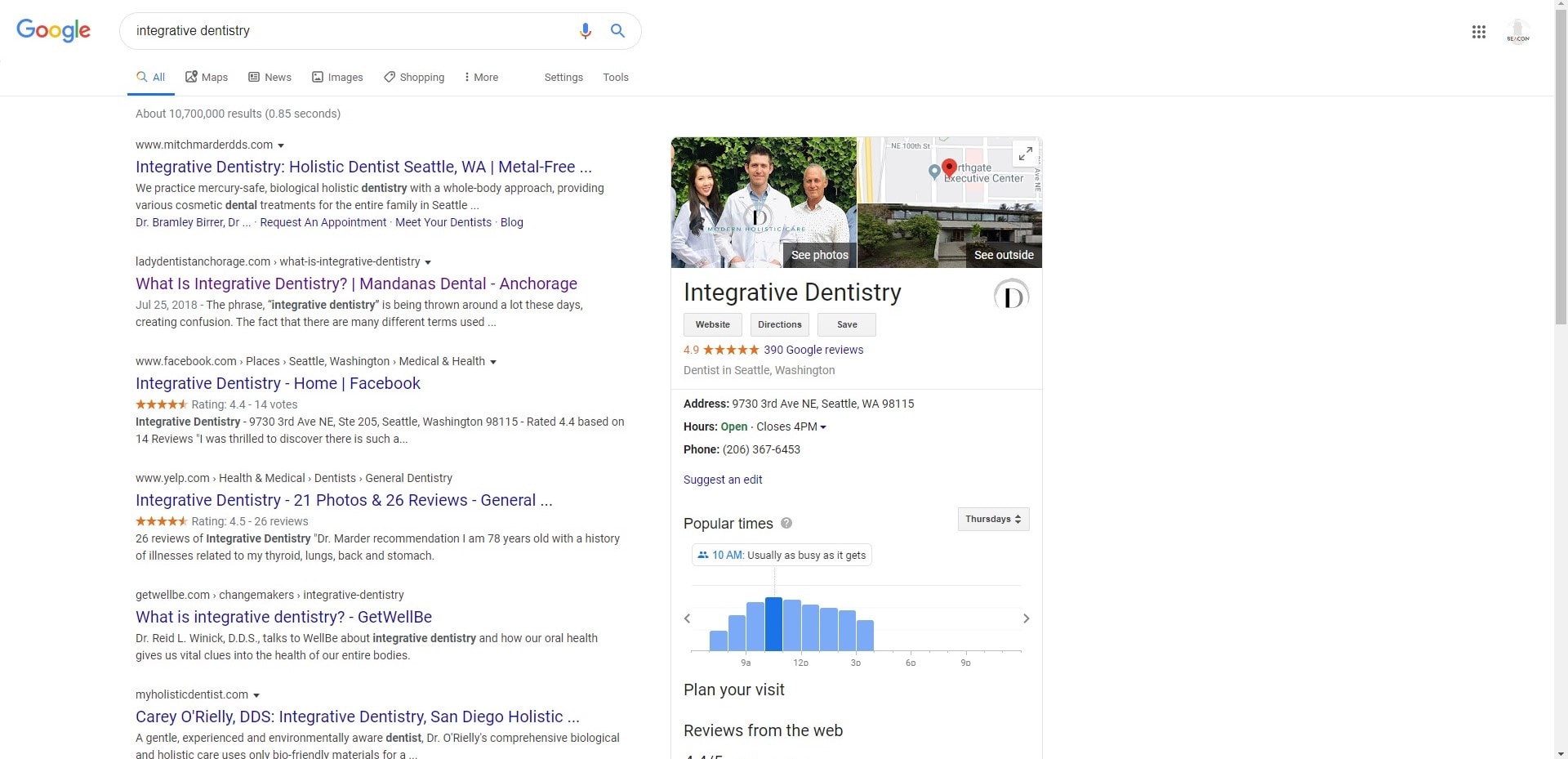Consistency.
If there is one word that encapsulates the secret to education marketing, it’s consistency.
We at Beacon Media + Marketing recommend that a weekly blogging strategy is best, but many of our clients have seen success with a minimal schedule of one blog per month! Although you can see results with this more minimal strategy, it will probably take longer for you to start ranking on Google, which, as we’ll explain, is one of the main goals of blogging. Here, we’ll explain some of the education marketing strategies we use to drive traffic to our clients’ website and ensure their blogs rank on Google.
Prefer to chat to a real person? Give us a call today.
What education marketing strategies will help my blogs rank on Google?
When we talk about ranking on Google, what we mean is the position of your website or post in people’s search results. There is extensive research that shows that most people don’t ever click on the second page of Google, and many won’t even scroll down the first page. One study found that only 0.78% of searchers clicked on something on the second page of Google. Clearly, it’s necessary to get on that first page, and ideally at the top of it. But how?
The answer is simple: a comprehensive, and well-researched, education marketing plan. Here are some of the methods our expert marketers use to get our clients on the top of the Google search rankings.
Case study: Beacon blogs
Let us take the time to discuss a couple of case studies that show our success with this strategy. Obviously, we’re a digital marketing agency, but these principles are universal, and they’ll definitely work for education marketing.
Two years ago, we decided we wanted to move into the functional medicine sector. Our first steps in this direction were to start blogging about it. We wrote blogs about each of the services we offer, targeting the keyword “functional medicine”. Within a few months, we had our blog posts ranking at both #1 and #2 on Google for the search “marketing for functional medicine”, and we’re still there today.

So, how did we do it?
We used a few simple tricks of the trade that you can also use for education marketing.
- First, we ensured that the blogs we wrote were of the specific length that works best for Search Engine Optimization (SEO). This changes every so often, depending on updates to Google’s algorithm, so make sure you research it now and then so you’re up-to-date.
- Second, we had a focused keyword strategy. This involves writing certain keywords that you want to target in your text and headings. For the functional medicine blogs, these included “functional medicine,” “marketing,” and “inbound marketing.”
- Finally, we ensured our posts are well optimized, work on mobile, are fast-loading, and have correctly set metadata. Metadata just means the information you provide Google about the contents of your blog, so they can determine how relevant it is to searchers.
Although we ranked these two blog posts at the top of Google, that was only part of our goal. The main objective of this was to generate leads. By having these blogs at the top of Google, we generate more leads to our website which converts into more sales. These two blogs now constitute a key part of our sales funnel! As you can see, these strategies are super simple and effective, so make sure you include them in your education marketing plan.
Case study: Mandanas Dental blogs
We don’t just keep our secrets to ourselves, either! We’ve also used these strategies to help our clients find success. One of our longest-standing clients, Dr. Owen Mandanas, decided a few years ago that she wanted to shift her focus to include integrative dentistry. Naturally, we started blogging on the subject!
Using the same techniques as for Beacon, we managed to rank Dr. Mandanas on the first page of Google. We’re so happy to have been able to achieve this for such a valued client. This approach to blog writing uses the inbound marketing philosophy, which will form the backbone of your education marketing strategy.
We’ll discuss in the next section.

Have we persuaded you? Let’s talk strategy.
Proven methods of education marketing
Okay, by now you’ve got a sense of the power of blogs and the impact they can make on your education marketing strategy. Next, we’re going to discuss some proven methods for writing successful blogs, including the inbound philosophy, question answering, and the waterfall method. These are all techniques you can use when writing your own blogs – whether you’re marketing a private school, a home school, or a specialty program.
Inbound philosophy of education marketing
The inbound marketing philosophy is a simple concept. People are online all day, every day, which means putting quality content in front of them is easier than ever. The core of the inbound education marketing philosophy is that if you consistently provide useful content to people, they will remember you and seek you out when they need your services. Imagine your customers are a cat. If you chase the cat it will run away from you, but if you have what the cat wants, it will come to you! So, how do you go about enticing the cat?
The first step to developing your education marketing plan is to researching what your customers are interested in. There are tools available to help you find out what searches people are making on Google (we use one called keywordtool.io). Once you’ve identified what people are researching, you can write blogs on it. People typically ask questions on Google, so answering these can be an effective way to provide quality content.
Use education marketing to answer questions
We’ve established that people use Google to ask questions, and that answering them is a highly effective method of providing quality content through your education marketing plan. If your blog is what people are relying on when they want to know something, they’ll remember you when they want to buy something.
Remember: Be there for them when they want to know something, and they’ll be there for you when they want to enrol in something.
Here’s a quick rundown of our process for blog writing:
- Keyword planning – We use Google’s keyword planner to find out what the most searched topics are, and what kind of competition there is for answering those questions.
- Finding questions – Next, we use Keywordtool.io to identify what questions people are asking about those topics.
- Writing – The next step is the most obvious, write a blog answering that question! When doing this it is important to include your keywords frequently, while flowing naturally.
- Setting the metadata – We’ve mentioned this before; basically, it’s the process of setting the title, description, and keywords in a format that Google can use to populate your result.
- Schedule – It’s important to be consistent if you want the best results. We recommend to our clients that they blog at least 1-2 times per week, but even with a minimal strategy, you can expect to see results in 6-9 months.
Want to apply this to your marketing plan? Our team can help.
Waterfall blogging is perfect for education marketing
The waterfall method of blogging is a highly successful method of getting your posts to rank on Google. One important thing to factor into your strategy is the inclusion of backlinks. Backlinks are links to your website from other credible websites. Google highly rates backlinks, so we can set up links to other posts in our own blog posts. This is a great way to organize posts, which you can use successfully for your education marketing strategy.
Here’s an example of a waterfall we created for some recent mental health blogs:
- Blog about Digital Marketing for Mental Health
- Blog about Mental Health Brands
- Sub-topic: Logo Design
- Sub-topic: Graphic Design
- Blog about Website Design for Mental Health
- Sub-topic: Landing Pages
- Sub-topic: Website Hosting
- Blog about Social Media for Mental Health
- Blog about Google Advertising for Mental Health
- Blog about Blog Marketing for Mental Health
- Blog about Video Production for Mental Health
As you can see, this looks a bit like a descending waterfall, with multiple layers all linked to one another (and to this blog too!). You can use this to discuss your programs, teaching style, student services, and more.
Link between SEO and education marketing
Search Engine Optimization (SEO) is the practice of using tools to help blogs your produce as part of your education marketing strategy rank on Google. This involves setting the keywords that we have chosen to target, and which we have used throughout the blog. We make sure to use them in the text, in the headers, and in the URL. We also set a featured image, as this boosts Google ranking, and write a custom excerpt which is displayed on the results page, this ensures that the text is displayed fully, and doesn’t end with an ellipsis.
In addition, we chose a title of the length that is shown to be most effective in catching people’s attention and using certain power words that have been shown to gain clicks. We hope that this has been a useful insight into some of the tips and tricks that we use to drive engagement with our blogs. If you’d like to learn more you can check out other posts we’ve published on digital marketing.
Ready to talk to the experts? Schedule a free consultation today.





